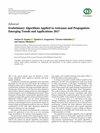Design of Microstrip Antenna Arrays with Rotated Elements Using Wilkinson Power Dividers for 5 G Customer Premise Equipment Applications
IF 1.1
4区 计算机科学
Q4 ENGINEERING, ELECTRICAL & ELECTRONIC
引用次数: 0
Abstract
Microstrip antenna arrays are proposed in this paper for the customer premise equipment (CPE) applications in the frequency range 1 (FR1) of the 5th generation (5 G) mobile networks. The proposed antenna arrays consist of three FR4 substrates. Antenna elements and feeding networks are optimized separately through parameter studies and then combined to form the proposed antenna arrays. Bandwidth-enhancing parasitic elements on the top substrate are broadside coupled to the microstrip antennas in the middle substrate, which are probe-fed by the microstrip feeding network using Wilkinson power dividers realized in the bottom substrate through the ground plane and the stud supporting air layer between the lower two substrates. Two antenna arrays, with four and eight antenna elements, are proposed for different gain specifications, 10 dBi and 12 dBi, respectively. Bandwidths of 10-dB return loss for both arrays fully covered the 5 G n78 frequency band (3.3–3.8 GHz). 20 dB isolation between antenna elements can also be achieved using the proposed layouts with rotated elements. The dimensions, radiation gain, and efficiency of the proposed antenna units, four-element array, and eight-element array are 65 × 65 × 11.4, 115 × 115 × 11.4, and 115 × 215 × 11.4 mm3, 6.2, 10.5, and 13 dBi, 74%, 56%, and 50%, respectively. The proposed antenna arrays exhibit the advantages of simple, low-cost, low-profile, and high-gain characteristics, which is potentially applicable to 5 G CPE outdoor unit (ODU)-related devices.利用威尔金森功率分配器为 5 G 客户端设备应用设计带旋转元件的微带天线阵列
本文提出的微带天线阵列适用于第五代(5 G)移动网络频率范围 1(FR1)内的用户端设备(CPE)应用。拟议的天线阵列由三个 FR4 基板组成。通过参数研究分别对天线元件和馈电网络进行了优化,然后将其组合成拟议的天线阵列。顶层基板上的带宽增强寄生元件与中间基板上的微带天线宽边耦合,中间基板上的微带天线由微带馈电网络探针馈电,微带馈电网络使用威尔金森功率分配器,在底层基板上通过接地平面和下面两个基板之间的螺柱支撑空气层实现。针对不同的增益规格(分别为 10 dBi 和 12 dBi),提出了两个天线阵列,分别有四个和八个天线元件。两个阵列的 10 分贝回波损耗带宽完全覆盖 5 G n78 频段(3.3-3.8 GHz)。利用旋转元件的拟议布局,天线元件之间也可实现 20 dB 的隔离。拟议的天线单元、四元阵列和八元阵列的尺寸、辐射增益和效率分别为 65 × 65 × 11.4、115 × 115 × 11.4 和 115 × 215 × 11.4 mm3、6.2、10.5 和 13 dBi、74%、56% 和 50%。所提出的天线阵列具有简单、低成本、外形小巧和高增益等特点,可用于 5 G CPE 室外单元(ODU)相关设备。
本文章由计算机程序翻译,如有差异,请以英文原文为准。
求助全文
约1分钟内获得全文
求助全文
来源期刊

International Journal of Antennas and Propagation
ENGINEERING, ELECTRICAL & ELECTRONIC-TELECOMMUNICATIONS
CiteScore
3.10
自引率
13.30%
发文量
158
审稿时长
3.8 months
期刊介绍:
International Journal of Antennas and Propagation publishes papers on the design, analysis, and applications of antennas, along with theoretical and practical studies relating the propagation of electromagnetic waves at all relevant frequencies, through space, air, and other media.
As well as original research, the International Journal of Antennas and Propagation also publishes focused review articles that examine the state of the art, identify emerging trends, and suggest future directions for developing fields.
 求助内容:
求助内容: 应助结果提醒方式:
应助结果提醒方式:


